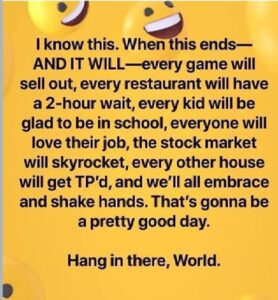
I don’t know who wrote this, but I love the optimism, the encouragement, the hopeful side to this pandemic. We need that confidence, don’t we? Bret Baier, a news anchor, daily offers a message of expectation when he ends his television program with this: “We are one day closer to putting this all behind us.”
I envision the day when Baier’s statement will be our reality and we can learn powerful lessons from it…lessons, I pray, we never forget.
We all know that this silent killer has sneaked in unnoticed, and as we battle this foe, I am mindful of another enemy we are warned about in Scripture. Be alert and of sober mind. Your enemy the devil prowls around like a roaring lion looking for someone to devour. (1 Peter 5:8) See any similarities?
Could there be a more frightening warning to those unaware of our enemy’s attempts to destroy? If we compare Covid-19 and Satan, we can’t help but recognize likenesses: Both prey on the weak; both remain unseen; both are contagious, and both appear intent on destroying humanity.
Still, if we remain vigilant, we can remain hopeful by understanding a few more things about these enemies:
- They sneak in unannounced. (“So what if I run a few errands I probably should postpone?”/“But encourage one another daily, as long as it is called ‘Today,’ so that none of you may be hardened by sin’s deceitfulness.” Hebrews 3:13.)
- They come through friends (“There’s nothing wrong with hanging with our pals at the beach.”/ “Whoever walks with the wise becomes wise, but the companion of fools will suffer harm.” Prov. 13:20.)
- They come when we ignore the warnings. (“Wear masks”/“Put on the full armor of God.” Eph. 6:11.)
Yet as contagious as this virus is, as contagious as sin is, the antidote is simple. We must isolate ourselves from anything that causes us to fall victim to their death traps. We must be mindful that there are bad things seeking to destroy us, both in the physical and the spiritual world. We cannot allow ourselves to so much as sniff these deadly evils. Instead, we must do what is smart…what is hopeful. Trusting in our medical professionals is one way to do that, but to be eternally careful, we must turn our lives to Jesus Christ and know that he is the ultimate hope.
So, as the meme above says, “Hang in there, World.” How do we do that? The answer is found in Deuteronomy 31:6: Be strong and courageous… for it is the Lord your God who goes with you. He will not leave you or forsake you. One day we will “put this all behind us.” The choice we make now will determine what will lie ahead.
That, Readers, is the Hope that matters.






